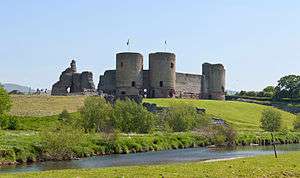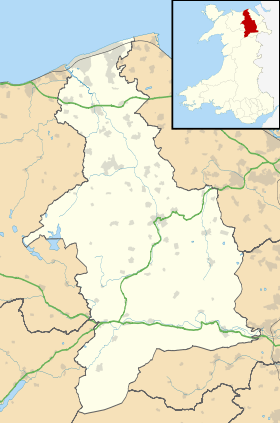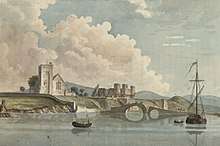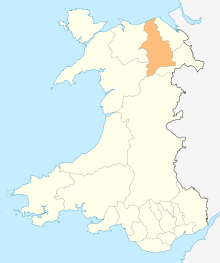Rhuddlan
Rhuddlan (Welsh pronunciation: [ˈr̥ɨðlan]) is a town, community and electoral ward in the county of Denbighshire, Wales — historically in Flintshire. Its associated urban zone is mainly on the right bank of the Clywd; it is directly south of seafront town Rhyl. It gave its name to the Welsh district of Rhuddlan from 1974 to 1996. At the 2001 Census, the population was 4,296[1] decreasing to 3,709 as at 2011.[2]
| Rhuddlan | |
|---|---|
 Rhuddlan Castle in May 2012 | |
 Rhuddlan Location within Denbighshire | |
| Population | 3,709 (2011) |
| OS grid reference | SJ025785 |
| Community |
|
| Principal area | |
| Ceremonial county | |
| Country | Wales |
| Sovereign state | United Kingdom |
| Post town | RHUDDLAN |
| Postcode district | LL18 |
| Dialling code | 01745 |
| Police | North Wales |
| Fire | North Wales |
| Ambulance | Welsh |
| UK Parliament | |
| Senedd Cymru – Welsh Parliament |
|
History

Just before Norman occupation of lower Gwynedd, the Perfeddwlad, Rhuddlan was the site of a Welsh cantref and served as the seat of government and capital of Gwynedd for the Welsh king Gruffydd ap Llywelyn (1007 – August 5, 1063), whose family may have been the traditional Welsh lords of Rhuddlan for generations. A mint established at Rhuddlan in the 1180s by Dafydd ab Owain, and later maintained by Llywelyn the Great, was responsible for minting the first native Welsh coinage since the reign of Hywel Dda.
The town is known for the ruins of Rhuddlan Castle, built by order of King Edward I from 1277 to 1282, and for the site of another castle at Twthill, built by the Norman Robert of Rhuddlan about 1072. Well-preserved Rhuddlan castle has a great round tower and many surviving walls. It was built soon after the conquest of Wales.
The town was thus where Edward I signed the Statute of Rhuddlan, laying down the way by which the Principality of Wales, created by the princes of Gwynedd, was to be governed.
The hymn tune "Rhuddlan" was brought to wider prominence by Ralph Vaughan Williams as music editor of the first edition of The English Hymnal in 1906, and it has since been adopted by numerous other hymnals. It is usually sung to the words of the hymns "Judge eternal, throned in splendour" and, more recently, "For the healing of the nations".
Rhuddlan railway station was part of the Vale of Clwyd Railway until it closed in the 1960s.
In 2001, the A525 bypass was completed, easing access to Rhyl. Since 2001 the centre of Rhuddlan has been largely redeveloped.
Notable people
- See Category:People from Rhuddlan
Photographer Philip Jones Griffiths, well known for his photographs during the Vietnam War, was born in Rhuddlan. Wales and Sunderland FC footballer David Vaughan was also born in the town. Lisa Scott-Lee of the pop band Steps and her brother Andy Scott-Lee lived in Rhuddlan.
References
- 2001 Census: Rhuddlan, Office for National Statistics, retrieved 30 June 2008
- "Community/Ward population 2011". Retrieved 24 May 2015.
External links
| Wikimedia Commons has media related to Rhuddlan. |
| Wikivoyage has a travel guide for Rhuddlan. |
